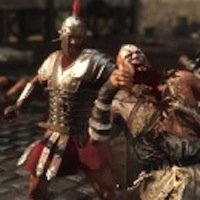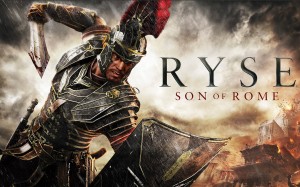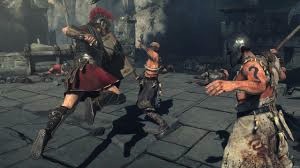aNewDomain.net — What the hell did I just play? That was my immediate reaction after I went through the whole campaign of Ryse: Son of Rome. I could barely get myself through the campaign; it was a mix of short storylines, cardboard characters, and childish ancient Roman stereotypes.
It wasn’t all bad, I’ll admit. The fighting mechanics were epic (i.e. all the slashed throats and chopped-off arms) and the graphics were absolutely stunning. However, if anyone dares mention that this RPG is Ubisoft quality, I will backslap some common sense into them.
Let’s start with the campaign itself. It’s nothing more than a generic rip-off of a Hollywood film. The plot wasn’t half bad, I suppose. You play the game as Marius, a Roman centurion who serves with the 14th Legion of Britain until he gets screwed over by the emperor, Nero. They could totally make a movie out of this. Oh wait, they already have. It’s called Gladiator.
While the storyline wasn’t so bad, the campaign itself was unoriginal and poorly conceived.
For example: One of my biggest complaints is the way Crytek presented its barbarians in Ryse. In the game the barbarians were classic, historically-inaccurate cavemen that had almost no diversity whatsoever. Now, just to get it out there, while I am a fan of Roman history, I am not an OCD historian when it comes to these types of video games. Sure, after playing good historically-accurate games, like Assassin’s Creed and the Total War series, I have decent expectations for game companies. However, considering that this game has glory points, which the player can use to purchase upgrades, and there’s the appearance of historical units, such as the Praetorian Guard, I believe Crytek intended Ryse to be a semi-historical game. If so, then why are there minotaur-like people in Scotland? It doesn’t make sense. The Scottish were known for painting themselves and wearing plaid (which is a scary fashion statement in itself).
History inaccuracies aside, the campaign presents a number of ridiculous twists. At one point, every barbarian tribe in the Empire, for some random reason, unites and commandeers a herd of giant war elephants for a giant deus ex machina invasion of Rome. Crytek, I beg of you, please just stick to making modern shooters, where a denouement like that would be an awesome way of capping a great campaign. Unfortunately in Ryse: Son of Rome, it just seems like an epic, yet rushed, climax, slapped on the end for that Hollywood-style ending.
The gameplay (for the most part) wasn’t so bad. There were a lot of details in the game which was good. Ryse is a classic example of how far the RPG genre has come from its primitive arcade origins seen in Street Fighter. The fighting style was almost Ubisoft quality, with that gritty realism from that “in your face”-style prevalent at the time. It gets very addictive going up against a plethora of giant warriors charging at you and just owning them like Bruce Lee from Enter the Dragon.
The fighting isn’t just one dimensional either. Players can also command archers and use a ballista for whole new levels of gameplay. That said, however, the fighting can get very repetitive. There’s very little variety in terms of moves that the player can execute, and the game’s mechanics of slow motion attacks by the enemy makes many levels bland, repetitive, and just downright boring. Eventually it gets to the point where it’s just a button mashing montage, and unlike other good button mashing games, like Dynasty Warriors, there are no special attacks to spice up gameplay.
For what it’s worth, all this repetitive gameplay makes the shortness of the campaign seem not so bad (the game clocks in at a measly three hours). The blandness is also augmented by the fact that there is no variety among your barbarian enemies either, which makes it painfully hard to fight the same boring enemies with the same boring moves. I like classical antiquity because of its diversity, cultures, and people. But this — this is a sheer travesty upon everything I loved about the classical age. In some small ways the classical age does come alive in Ryse, however. The game does a good job recreating the great buildings of the Empire, with stunning real-world graphics. As a player you can feel immersed in the world of Rome, as if you were someone serving on the frontier (if you overlook all the historical inaccuracies, of course).
The game has a nice multiplayer feature, which gives it a redeeming quality from its lackluster campaign (not enough though). For multiplayer, the player is put into the coliseum as a gladiator and has to fight his way through waves of enemies while attempting to keep the interest of the crowd. To my surprise, the multiplayer feature was pretty good. The arena has multiple elements coming at the player (archers and barbarians, to name two). And this, along with the crowd’s fickleness, helps keep the game fresh and alive. Maybe it’s because the multiplayer has the elements that singleplayer lacks, like variety, difficulty, and originality. While this unexpected feature was good, it certainly was not good enough to restore my hopes in this disappointing game.
That brings me to my verdict, which is a flat 4/10. The gameplay was repetitive, the campaign was unoriginal and filled with many unrealistic mechanics that just make me want to say WTF? The game’s multiplayer feature, its awesome graphics, and realistic fighting scenes saved it from getting an even lower score. Overall, neither my love for the classical era, nor for Crytek’s games have died down. Rather, I simply expected more from this game with all the hype building up to its release and my overall faith in the Crytek company. I’m convinced that Crytek isn’t finished yet. With its new, much-anticipated game Homefront 2 coming out this year, I look forward to seeing the company kick ass where it does best.
Until next time, this is Fegelein Puching Zhang signing off for aNewDomain.net.
Based in Chicago, Fegelein Puching Zhang is our gaming scribe at aNewDomain.net. Read more of his work here or contact Fegelein at puching@anewdomain.net.















